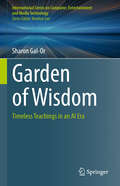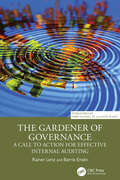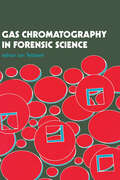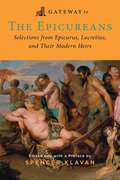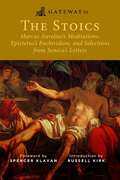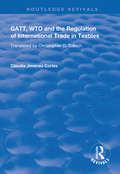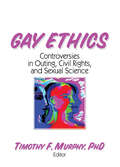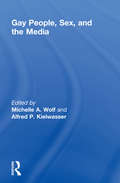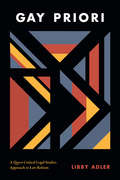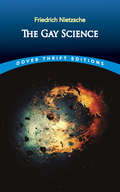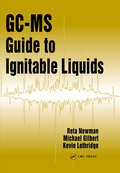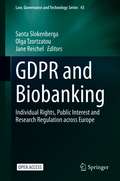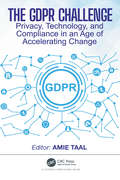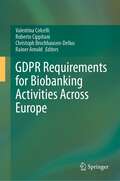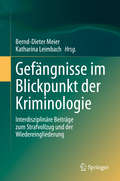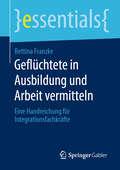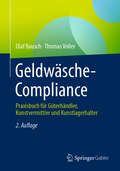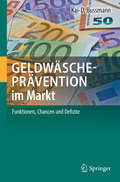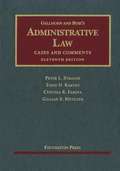- Table View
- List View
Garden of Wisdom: Timeless Teachings in an AI Era (International Series on Computer, Entertainment and Media Technology)
by Sharon Gal-OrGarden of Wisdom: Timeless Teachings in an AI Era is a transformative exploration of the intersection between ancient wisdom and modern technology. This book offers a comprehensive framework for the ethical evolution of artificial intelligence, integrating timeless principles from biblical narratives, ecological systems, and quantum consciousness. The book introduces groundbreaking concepts like Angelic Intelligence (AI), Nature Intelligence (NI), and regenerative design, urging readers to harmonize technological advancements with sustainability and human dignity. It addresses the challenges of the AI era with actionable strategies such as the Kosmic Tree of Life and Circadian AI, fostering a vision of a future guided by ethics and interconnectedness. Garden of Wisdom is not just a guide for AI professionals but a call to humanity to co-create a flourishing, sustainable world.
The Gardener of Alcatraz: A True Story
by Emma Bland SmithA prisoner gardens his way to freedom in this inspiring picture-book biography.When Elliott Michener was locked away in Alcatraz for counterfeiting, he was determined to defy the odds and bust out. But when he got a job tending the prison garden, a funny thing happened. He found new interests and skills--and a sense of dignity and fulfillment. Elliott transformed Alcatraz Island, and the island transformed him. Told with empathy and a storyteller's flair, Elliott's story is funny, touching, and unexpectedly relevant. Back matter about the history of Alcatraz and the US prison system today invites meaningful discussion.
The Gardener of Governance: A Call to Action for Effective Internal Auditing (Security, Audit and Leadership Series)
by Rainer Lenz Barrie EnslinThis book builds on the popular GARDENER OF GOVERNANCE article, which enjoys amazing traction in the professional community globally and has been translated into 25+ languages. The Lenz and Jeppesen (2022) thought-piece introduced the 5 "Ps" as paths for the betterment of internal auditing: People, Public, Performance (Prosperity), Purpose (Profession) and Planet. These main fields of action and focus for the internal audit profession may determine the future role of internal auditing, its legitimacy, relevance and significance. The book aims to provide practical guidance for performing impactful internal audit assignments. Some readers will no doubt view the authors as unorthodox and the book may be a stretch for the purist, insisting on adherence to traditional rules.It is pleasing to see that the new Global Internal Audit Standards advocate a pragmatic and holistic approach, which should further stimulate internal audit functions moving into uncharted territory that may require from them to become more resourceful in their approach as advocated for by the authors. This book is an inspiration and encouragement for all internal auditors who want to do better and aim higher, particularly the forthcoming generation of internal auditors who are open-minded and who may sometimes doubt themselves because of opposition or insecurity. We believe that internal auditors who absorb the knowledge and make it their own will benefit from this book on their career trajectory.This easy read is relatable, engaging and convincing to support internal auditors globally who are seeking to widen their repertoire on their journey to become modern and effective internal auditors. This book is relevant and will be insightful to internal auditors, students and lecturers, as well as other stakeholders including senior and executive managers and board members. Drawing on Rainer’s vast practical expertise gained from over 300 audits in more than 50 countries, along with his series of publications and adding Barrie’s hands-on advice benefitting from 30 years of entrepreneurial experience, the authors create an interesting blend of creative authoring that challenges the status quo and advises emerging internal auditors on becoming more impactful and effective.We’re dropping the pebble in the pond. Let’s see how far the ripples spread and to what effect.
Gardens and Neighbors: Private Water Rights in Roman Italy
by Cynthia Jordan Bannon"Gardens and Neighborswill provide an important building block in the growing body of literature on the ways that Roman law, Roman society, and the economic concerns of the Romans jointly functioned in the real world." --Michael Peachin, New York University. As is increasingly true today, fresh water in ancient Italy was a limited resource, made all the more precious by the Roman world's reliance on agriculture as its primary source of wealth. From estate to estate, the availability of water varied, in many cases forcing farmers in need of access to resort to the law. In Gardens and Neighbors: Private Water Rights in Roman Italy, Cynthia Bannon explores the uses of the law in controlling local water supplies. She investigates numerous issues critical to rural communities and the Roman economy. Her examination of the relationship between farmers and the land helps draw out an understanding of Roman attitudes toward the exploitation and conservation of natural resources and builds an understanding of law in daily Roman life. An editor of the series Law and Society in the Ancient World, Cynthia Jordan Bannon is also Associate Professor of Classical Studies at Indiana University, Bloomington. Her previous book was The Brothers of Romulus: Fraternal Pietas in Roman Law, Literature, and Society(1997). Visit the author's website: http://www.iub.edu/~classics/faculty/bannon.shtml.
Gas Chromatography In Forensic Science
by I. TebbettDescribes the application of gas chromatography to various aspects of forensic chemistry. Following an introduction to the basic theory of chromatographic separations, the text discusses specific issues, such as drug analysis, fires and explosives, alcohol and toxicology.
Gateway to the Epicureans: Epicurus, Lecretius, and their Modern Heirs
by Lucretius EpicurusThe Greek Philosopher behind Nearly Every Bad Idea
Gateway to the Stoics: Marcus Aurelius's Meditations, Epictetus's Enchiridion, and Selections from Seneca's Letters
by Marcus Aurelius Epictetus SenecaThe one book you need to master stoic philosophy!This classic collection, newly revised and with a foreword by classicist Spencer Klavan, includes the famed original introduction by Russell Kirk, the full text of the Meditations of Marcus Aurelius, the complete Enchiridion of Epictetus, and key selections from Seneca and Hierocles of Alexandria in one compact volume.
GATT, WTO and the Regulation of International Trade in Textiles (Routledge Revivals)
by Claudia Jiménez CortésPublished in 1997, in this book an attempt has been made to analyze the legal structure of GATT and the WTO as well as those agreements which control trade in textiles. One of the GATT’s major failures was its inability to come into line with the new economic reality and the needs of those states who created this system for controlling international trade. Trade in textiles was an excellent example of this. Now, the WTO aims to overcome this problem thanks to its greater pragmatism and its search for solutions to free trade difficulties. The WTO is not, however, the perfect solution. Its highly political character allows room for improvement even though the key to its success still lies with the effective cooperation of member states. As for the textile sector, this new panorama for trade in goods provides it with a new opportunity to finally return to the general legal framework in the year 2005.
Gay Ethics: Controversies in Outing, Civil Rights, and Sexual Science
by Timothy F MurphyGay Ethics is an anthology that addresses ethical questions involving key moral issues of today--sexual morality, outing, gay and lesbian marriages, military service, anti-discrimination laws, affirmative action policies, the moral significance of sexual orientation research, and the legacy of homophobia in health care. It focuses on these issues within the social context of the lives of gay men and lesbians and makes evident the ways in which ethics can and should be reclaimed to pursue the moral good for gay men and lesbians.Gay Ethics is a timely book that illustrates the inadequacies of various moral arguments used in regard to homosexuality. This book reaches a new awareness for the standing and treatment of gay men and lesbians in society by moving beyond conventional philosophical analyses that focus exclusively on the morality of specific kinds of sexual acts, the nature of perversion, or the cogency of scientific accounts of the origins of homoeroticism. It raises pertinent questions about the meaning of sexuality for private and public life, civics, and science. Some of the issues covered: Sexual Morality Outing Same-Sex Marriage Military Service Anti-Discrimination Laws Affirmative Action Policy The Scientific Study of Sexual Orientation Bias in Psychoanalysis Homophobia in Health CareGay Ethics presents a wide range of perspectives but remains united in the common purpose of illuminating moral arguments and social policies as they involve homosexuality. The chapters challenge social oppression in the military, civil rights, and the social conventions observed among gay men and lesbians themselves. This book is applicable to a broad range of academics working in gay and lesbian studies and because of its current content, is of interest to an educated lay public. It will be a standard reference point for future discussion of the matters it addresses.
Gay People, Sex, and the Media
by Michelle Wolf Alfred KielwasserHere is a provocative book that examines precisely how and why mass communication has an impact upon the sexual realities of our lives. Written in response to a demand for information that cuts across many of the boundaries found in more traditional books on sexuality and mass communication, Gay People, Sex, and the Media covers a broad range of sexual identity, socialization, and mass communication issues and represents a variety of theoretical and methodological orientations. Although the chapters are diverse, they all focus on how the mass media--television, radio, films, newspapers, magazines, and recorded music--contribute significantly to the very definitions we form of ourselves and of each other. In part, this informative volume discusses and analyzes several concerns regarding minority perspectives in the context of the the study of mass media content and effects; analyzes mediated information about AIDS and highlights the responsibility of the mass media to disseminate more accurate information; addresses the relationships between mass media content (primarily television) and sexual socialization; explores issues confronted by individuals whose sexual orientations are generally perceived as falling out of the mainstream; and provides a selective bibliography of print, aural, and visual resources on gay men, lesbians, and the mass media. Unique in contrast to other books of research on human sexuality and mass communication, Gay People, Sex, and the Media gives more than a passing reference to issues concerning sexual identity and gay and lesbian concerns. Scholars and students of human sexuality, especially those who wish to explore their field from a communications perspective, will find this to be a valuable book. It is also useful to communications researchers and teachers, particularly those studying mediated communications in society, media ethics, and sex and the media. Finally, for professionals involved in creating or monitoring media content or forging public policy and community action programs in response to these issues, this volume serves as an essential sourcebook.
Gay Priori: A Queer Critical Legal Studies Approach to Law Reform
by Libby AdlerLibby Adler offers a comprehensive critique of the mainstream LGBT legal agenda in the United States, showing how LGBT equal rights discourse drives legal advocates toward a narrow array of reform objectives that do little to help the lives of the most marginalized members of the LGBT community.
The Gay Science: With A Prelude In Rhymes And An Appendix Of Songs (Dover Thrift Editions)
by Friedrich NietzscheAlthough dour in appearance and formidable in reputation, Friedrich Nietzsche was an ardent practitioner of the art of poetry—known in twelfth-century Provençal as "the gay science." This extensive collection of prose and verse offers a sophisticated treatment of the philosophical themes and views central to his thinking, as well as the ideas that proved most influential to later philosophers. Dating from the era when Nietzsche was at the peak of his intellectual powers, most of this book was written just before Thus Spoke Zarathustra, and the rest of it five years later, after Beyond Good and Evil. Zarathustra makes his first appearance in these pages, along with the author's well-known proclamation of the death of God. Readers will find this volume a wellspring for some of Nietzsche's most sustained and thought-provoking discussions of art and morality, knowledge and truth, the intellectual conscience, and the origin of logic, as well as the largest collection of Nietzsche's published poetry.
GC-MS Guide to Ignitable Liquids
by Michael W. Gilbert Reta Newman Kevin LothridgeThe rapidly increasing number of different ignitable liquid formulations available today poses a new challenge to fire debris analysts and other forensic chemistry specialists - that of accurately identifying and classifying ignitable liquids with unfamiliar chromatographic patterns. GC-MS Guide to Ignitable Liquids addresses that challenge with a selection of more than 100 different ignitable liquid formulations designed to supplement the laboratory's standard collection. Both total ion chromatograms and extracted ion chromatograms (mass chromatograms) are included. Written by authors who are also experienced forensic chemists, this complete reference is the only single source of information on ignitable liquids - a must for students of fire science, forensic chemists, and anyone conducting fire debris analysis.
The GCC Banking Sector: Topography and Analysis
by Abdullah Al-Hassan May Khamis Nada OulidiA report from the International Monetary Fund.
GDPR and Biobanking: Individual Rights, Public Interest and Research Regulation across Europe (Law, Governance and Technology Series #43)
by Santa Slokenberga Olga Tzortzatou Jane ReichelThis open access book focuses on the discrepancies in biobank research regulations that are among the most significant hurdles to effective research collaboration. The General Data Protection Regulation (GDPR) has established stringent requirements for the processing of health and genetic data, while simultaneously allowing considerable multi-level exceptions for the purposes of scientific research. In addition to directly applicable exceptions, the GDPR places the regulatory responsibility for further defining how the Member States strike a balance between the individuals' rights and the public interest in research within their national legal orders. Since Member States' approaches to the trade-off between data subjects' rights on the one hand, and appropriate safeguards on the other, differ according to their ethical and legal traditions, their data protection requirements for research also differ considerably. This study takes a comprehensive approach to determine how the GDPR affects regulatory regimes on the use of personal data in biobanking research, with a particular focus on the balance between individuals' rights, public interest and scientific research. In this regard, it has two main goals: first, to scrutinize the GDPR research regime, its objective and constitutive elements, the impact it has on biobanking, and its role in a changing EU landscape post-Brexit; and second, to examine how various exceptions have been operationalized nationally, and what challenges and opportunities this diversification entails. The book not only captures the complexity GDPR creates for biobanking, but also sheds light on various approaches to tackling the corresponding challenges. It offers the first comprehensive analysis of GDPR for biobanking, and the most up-to-date overview of the national biobank regulatory frameworks in Europe.
The GDPR Challenge: Privacy, Technology, and Compliance in an Age of Accelerating Change
by Amie TaalConsent is necessary for collecting, processing and transferring Personal Identifiable Information (PII) and sensitive personal data. But to what extent? What are the limitations and restricts to avoid penalties under The General Data Protection Regulation 2018 (GDPR) rules, which may be up to 4% of annual global turnover or €20 million (whichever is higher), enforcements and sanctions? Under GDPR Article 51, each EU Member State shall maintain an independent public authority to be responsible for monitoring the application of this regulation to protect the fundamental rights of data subjects (Supervisory Authority). The Supervisory Authority has powers to issue warnings, conduct audits, recommend remediation, order erasure of data and suspend data transfers to a third country.GDPR has changed the way data is used, accessed and stored. It's reach extends well beyond the European Union and is the basis of other data privacy laws around the world.This book provides a review and guidance on implementing and compliance of GDPR while taking advantage of technology innovations and supported by real-life examples. The book shows the wide scope of applications to protect data privacy while taking advantage of processes and techniques in various fields such as eDiscovery, Cyber Insurance, Virtual-based Intelligence, Information Security, Cyber Security, Information Governance, Blockchain and Biometric technologies and techniques.
GDPR For Dummies
by Suzanne DibbleDon’t be afraid of the GDPR wolf! How can your business easily comply with the new data protection and privacy laws and avoid fines of up to $27M? GDPR For Dummies sets out in simple steps how small business owners can comply with the complex General Data Protection Regulations (GDPR). These regulations apply to all businesses established in the EU and to businesses established outside of the EU insofar as they process personal data about people within the EU. Inside, you’ll discover how GDPR applies to your business in the context of marketing, employment, providing your services, and using service providers. Learn how to avoid fines, regulatory investigations, customer complaints, and brand damage, while gaining a competitive advantage and increasing customer loyalty by putting privacy at the heart of your business. Find out what constitutes personal data and special category data Gain consent for online and offline marketing Put your Privacy Policy in place Report a data breach before being fined 79% of U.S. businesses haven’t figured out how they’ll report breaches in a timely fashion, provide customers the right to be forgotten, conduct privacy impact assessments, and more. If you are one of those businesses that hasn't put a plan in place, then GDPR For Dummies is for you.
GDPR Requirements for Biobanking Activities Across Europe
by Sabrina Brizioli Alessandra LangellaThe book deals with the effective operation of the rules related to biomedical research and pays attention to the activities of the national legislatures of the 27 Member States in the field of scientific research. This multilevel system has an impact on biobanking activity. The book answers questions realized by operators on the main biobanks around the EU in the field of GDPR. The authors and editors used the questions born from brainstorming among members of the Association European, Middle East & Africa for Biopreservation and Biobanking (ESBB) to offer to the operators in biobanking activity and researchers quickly answer to their daily questions, but with authors highest quality. Further the book provides a comprehensive review of the rapidly expanding field of biobanking. It provides researchers and scholars working on biobanking and bio-sharing and more in general in the university hospitals and clinical trial consortiums, and companies, biomedical researchers, but also jurists and the professionals (in particular judges, lawyers, officers) an instrument rigorous but easy to use of the GDPR in the case of biobanking activities. The book identifies a methodological path to tackle the legal or ethical problem on a specific scientific-technological to verify existing solutions and give ideas for future applications. The importance of the legal solution influences the implementation of the development of the biobanking activity service itself.
Gefängnisse im Blickpunkt der Kriminologie: Interdisziplinäre Beiträge zum Strafvollzug und der Wiedereingliederung
by Bernd-Dieter Meier Katharina LeimbachDas Buch liefert aus rechtlicher und kriminologischer Perspektive einen aktuellen Blick auf den Strafvollzug und die Wiedereingliederung nach der Entlassung. Namhafte Autoren aus Wissenschaft und Praxis stellen in gut verständlicher Weise ihre Forschungsergebnisse vor und geben einen Einblick in ihre Tätigkeit. Thematisiert werden die konzeptionellen und rechtlichen Rahmenbedingungen für den Strafvollzug und das Übergangsmanagement. Ausführlich behandelt werden unterschiedliche Vollzugsarten und Gefangenengruppen. Auch für die Wissenschaft interessante Fragen nach der richtigen Herangehensweise bei der Erforschung der Vollzugswirklichkeit und der durch den Vollzug bewirkten Veränderungen bei den Gefangenen werden angesprochen.
Geflüchtete in Ausbildung und Arbeit vermitteln: Eine Handreichung für Integrationsfachkräfte (essentials)
by Bettina FranzkeDie Integration von Geflüchteten ist eine zentrale gesellschaftspolitische Aufgabe in Deutschland. Dieses essential geht auf Herausforderungen in der beschäftigungsorientierten Beratung und Vermittlung von Geflüchteten ein. Dazu werden acht Critical Incidents und drei Gesprächsleitfäden vorgestellt. Die Gesprächsleitfäden behandeln den Umgang mit wechselseitigen Erwartungen, die Suche nach beruflichen Zielen sowie die Vorteile einer Ausbildung bzw. Qualifizierung.
Geflüchtete in ländlichen Regionen Deutschlands (Studien zur Migrations- und Integrationspolitik)
by Peter Mehl Johanna Fick Birgit Glorius Stefan Kordel Hannes SchammannDie Open-Access-Publikation präsentiert umfangreiche empirische Analysen zu Halte- und Bleibeorientierung Geflüchteter und richtet den Blick dabei besonders auf die Situation der ländlichen Regionen Deutschlands. Migrations- und Integrationsforschung in Deutschland war bislang überwiegend auf Großstädte ausgerichtet. Durch den vermehrten Zuzug geflüchteter Menschen seit 2014 sehen sich jedoch auch Kleinstädte und Dörfer in ländlichen Regionen verstärkt mit Aufgaben der Aufnahme und Integration von Geflüchteten konfrontiert. Ziel dieses Buches ist es, empirisch fundiert zu beantworten, unter welchen Voraussetzungen und wie humanitäres Engagement und ländliche Entwicklung erfolgreich verbunden werden können und wie dies von Politik und Zivilgesellschaft positiv beeinflusst werden kann.
Geldwäsche-Compliance: Praxisbuch für Güterhändler, Kunstvermittler und Kunstlagerhalter
by Olaf Bausch Thomas VollerDieses Buch bietet Güterhändlern, Kunstvermittlern und Kunstlagerhaltern einen schnellen und verständlichen Einstieg in die Vorschriften des Geldwäschegesetzes (GwG) und versteht sich als Praxishandbuch zur Umsetzung der gesetzlichen Anforderungen.Die vollständig überarbeitete, 2. Auflage gibt die zum 1. Januar 2020 bestehende Rechtslage wieder. Das Buch richtet sich an mit Gütern handelnde Unternehmen, die in Compliance mit den gesetzlichen Anforderungen interne Aufsichtsstrukturen aufbauen, um Risiken frühzeitig erkennen und Verstöße verhindern zu können.
Geldwäscheprävention im Markt
by Kai-D. BussmannDas Werk basiert auf einer umfassenden Studie zur Geldwäsche in Deutschland, die um kriminologische und ökonomische Aspekte ergänzt wurde. Ausgehend von statistischen Erhebungen und der aktuellen Rechtslage werden Handlungsempfehlungen entwickelt. Im Mittelpunkt steht dabei der Nicht-Finanzsektor, soweit er gesetzlich zur Prüfung und Meldung von Verdachtsfällen angehalten ist.Bei der Geldwäsche sind die Schäden kaum zu fassen und präventive Maßnahmen schwer durchsetzbar. Letzteres liegt vor allem an mangelnder Sensibilität im alltäglichen Geschäftsleben und an strukturellen Gegebenheiten. Die Geldwäsche ist nahezu untrennbar mit den Geschäften der legalen Wirtschaft verflochten. Anders als bei Delikten wie Betrug muss sich der gewerbliche Empfänger von Vermögenswerten nicht über die mögliche Schlecht- oder Nichtleistung seines Geschäftspartners Gedanken machen, sondern über die Gründe seiner Zahlungsfähigkeit, die in vielen Fällen kaum festzustellen sind. Das Werk zeigt die weitreichenden Folgen der Geldwäsche für Wirtschaft und Gesellschaft auf, etwa nationale und globale Wettbewerbsverzerrungen und Entwicklungshemmnisse für Entwicklungs- und Schwellenländer. Einer branchenspezifischen Risikobewertung folgenden konkrete Vorschläge zur Bekämpfung der Geldwäsche, zum Beispiel intensivere Aufklärung der Wirtschafts- und Berufsverbände, AML-Compliance in Unternehmen sowie die Einführung einer Höchstgrenze für Bargeldtransaktionen und eines Transparenzregisters. Das Buch richtet sich an alle, die sich im Rahmen von Studium und Lehre oder in der Praxis mit Geldwäsche auseinandersetzen.
Gellhorn and Byse's Administrative Law: Cases and Comments (11th Edition)
by Peter L. Strauss Todd RakoffThis authoritative casebook presents a comprehensive treatment of the doctrinal basis of administrative law that students need to know to practice competently and also a substantial development of the scholarly literature that has, from many perspectives, critiqued the existing law. The 11th edition continues the tradition of offering instructors a rich theoretical, historical and political context for the cases. At the same time, recognizing changing pedagogical demand, the book offers a leaner presentation of many topics and more cues for helping students navigate the book.
Gemeinnützige Krankenhäuser im Gemeinnützigkeitsrecht und im europäischen Beihilferecht (Schriften zum Stiftungs- und Gemeinnützigkeitsrecht)
by Luisa Margitta BraunWährend sich das Gemeinnützigkeitsrecht grundsätzlich durch seine Marktferne auszeichnet, verlangt das Europarecht größtmöglichen Wettbewerb. Trotz dieser Dichotomie muss sich der nationale Gesetzgeber auch bei Steuervergünstigungen für gemeinnützige Zwecke an das Unionsrecht halten. Die Frage, ob Steuererleichterungen zugunsten gemeinnütziger Einrichtungen mit dem Unionsrecht und insbesondere mit dem Beihilferecht vereinbar sind, verdichtet sich bei Trägern sogenannter Zweckbetriebe. Diese unterhalten einen wirtschaftlichen Geschäftsbetrieb, treten mit diesem in den Wettbewerb und sei es zur Verwirklichung gemeinnütziger Zwecke. Für die Untersuchung greift die Arbeit exemplarisch den Zweckbetrieb des Krankenhauses heraus, bei welchem sich einerseits der Zwiespalt zwischen Wettbewerb und Gemeinwohlorientierung besonders verdichtet, sich andererseits aber unionsrechtlich über Artikel 106 Absatz 2 AEUV gemeinwohlorientiert lösen lässt.
